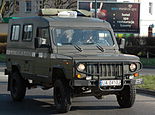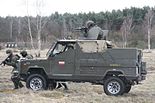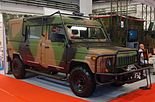Tarpan Honker
This article needs additional citations for verification. (January 2013) |
| Honker | |
|---|---|
 A side view of a parked Honker. | |
| Overview | |
| Manufacturer | FSR (1988-1996) Daewoo Motor Polska (1996-2001) Andoria-Mot (2002-2003) Intrall (2003-2007) FS Honker (2009-2016) DZT Tymińscy |
| Also called | FSR Tarpan Honker Daewoo Honker Andoria Honker Intrall Honker DZT Tymińscy Honker |
| Production | 1988-2016 |
| Assembly | Poland, Poznań Poland, Lublin |
| Body and chassis | |
| Class | Off-road vehicle |
| Layout | 4x4 |
| Chronology | |
| Predecessor | FSR Tarpan |
Honker (initially known as Tarpan Honker, also Daewoo Honker, Andoria Honker, Intrall Honker 4x4, and DZT Tymińscy Honker) is a Polish multi-purpose off-road vehicle. Shown as a prototype in 1984, it was produced in a variety of models. It is best known for its use by the Polish Army both at home and in Iraq. Apart from the army and police forces, the company to own the largest number of Honkers is the Polish KGHM company, which uses them to transport miners underground.
History[]
The prototype of the Honker was created in 1984 in the Fabryka Samochodów Rolniczych (Farming Vehicles Works) or FSR in Poznań. Based on the earlier design of the , it was to replace it as the basic Polish-made pick-up truck in public service. However, it was not until 1988 that the serial production was started. The car was produced in two variants:
- Tarpan Honker 4012, a typical hardtop with room for up to 10 passengers
- Tarpan Honker 4022, a pick-up truck with room for 2 passengers
Soon after production started, the FSR started the construction of a new, slightly shorter and more narrow (2210 mm) version, which received the designation of Honker 4032. Although the prototype never entered serial production, it was the first car to be known solely as Honker, without any indication of its relation to the earlier Tarpan.
In late 1996 the design was bought by the Daewoo Motor Polska company, who decided to continue the production in Lublin. The interior design was slightly modified and the car received the new designation of Daewoo Honker 2324. The car did not differ much from the original version and was available in the same set of options. There were plans for creation of a modernized Daewoo Honker II with either 4x2 or 4x4 drive, but they were called off and instead the factory only modified the external design and continued the production under a new name of Daewoo Honker 2000.
After the bankruptcy of Daewoo, the license was inherited by two companies. Andoria-Mot continued the production in small quantities from 2002–2003, and in 2003 created two modernized versions, both in a hard-top pick-up combination. Intrall Polska made the Honker from Jan. 2004-Spring 2007. In 2004, Intrall created another model, the off-road car Honker MAX. In addition, in 2004 the Honker saw yet another modification: an armored and mine-protected heavier version Honker Skorpion 3 was created specifically for the Polish Army forces in Iraq.
In 2016, the company producing the Honker, , filed for bankruptcy, ending the production of the vehicle.[1]
Variants[]
Honker trucks were produced in multiple versions, including hardtop versions, box trucks, and pick-up trucks. Honkers produced up to 1992 used M20 gasoline engines shared with Żuk and Nysa trucks. In later models, M20 engine was replaced with gasoline engines from the FSO Polonez car, Iveco diesel engines (2.5 dm ³), and from 1997 onwards used the turbo engines Andoria 4CT90 and later 4CTi90. The truck had a 3-door body, based on a rigid frame bridges driving the leaf springs.
Production[]
Production models of Honker was low, reaching a maximum level of a few hundred vehicles. In Poznan in 1992, FSR built 450 autos in 1992; 314 autos in 1994; and 288 autos in 1995. FSR production stopped in early 1996.
In mid 1996 Daewoo bought the rights and established Daewoo Motor Poland Sp. Ltd. to produce vehicles. Production resumed in autumn 1996 trials for the assembly of Honkers in Lublin. In both factories, they built only around 20 autos.
Yearly production were as follows:
- 1997 they built 155 autos;
- 1998 - 232 autos;
- 1999 - about 350 autos;
- 2000 - about 200 autos;
- 2001 - about 30-40 autos;
- 2002 - 140 autos;
- 2003 - 278 autos;
- 2004 - about 490 autos;
- 2005 - 177 autos;
- 2006 - 245 autos;
- 2007 - 35 autos.
In the spring of 2007, production was again suspended.
In 2008, the Ukrainian company DP Naftogazbud Polior was to begin building the Honker again, but never did.
In 2009, Syndyk DMP, the owner of the rights to Honker, sold the company to DZT Tymińscy, which then restarted production of the Honker.[2]
Operators[]

This section needs additional citations for verification. (March 2019) |
 Azerbaijan - 3 Honkers in use by mine agencies.
Azerbaijan - 3 Honkers in use by mine agencies. Iraq - dozen Honker Skorpion 3 (probably unarmed) in use by Iraqi army.
Iraq - dozen Honker Skorpion 3 (probably unarmed) in use by Iraqi army. Latvia - used by Latvian Forces in Iraq.
Latvia - used by Latvian Forces in Iraq. Lithuania - used by Lithuanian Forces in Iraq.
Lithuania - used by Lithuanian Forces in Iraq. Nigeria - used by Nigerian Armed Forces.
Nigeria - used by Nigerian Armed Forces. Poland - in use by Polish Land Forces, Policja and others.
Poland - in use by Polish Land Forces, Policja and others. Ukraine - several dozen Honkers were bought from Polish Land Forces by citizens of Ternopil (fund-raiser). Honkers were also renovated and send to War in Donbass.[3]
Ukraine - several dozen Honkers were bought from Polish Land Forces by citizens of Ternopil (fund-raiser). Honkers were also renovated and send to War in Donbass.[3]
Gallery[]

Honker in Kołobrzeg

Honker Skorpion-3

Honker Baryton
Honker Skorpion-3 and a ZWD-3 command vehicle based on a Honker in Iraq during the Second Persian Gulf War
Tarpan Honker

Presentation of Honker Skorpion 3 before mission in Iraq in 2003

4x4 LWB Honker to offer for a civilian market
A convoy for the Polish CIMIC group (Civilian Military Cooperation) heads to an elementary school in Ad Diwaniyah, Iraq on January 19, 2005. They are going to deliver school supplies and toys.

Honker in fire - engine version. This fire engine served for many years in one of the SOPiRG ArcelorMittal Polska fire fighting units.

Honker in 5-door version with new Polish camouflage, demonstrated on Defence Industry Exposition () in Kielce in 2015. Note the new HONKER brand logo on the car.
| Wikimedia Commons has media related to Honker. |
References[]
- ^ Wilk, Remigiusz (17 August 2017). "Poland opens tenders for new light vehicles". IHS Jane's 360. Archived from the original on 19 August 2017. Retrieved 19 August 2017.
- ^ "Archived copy". Archived from the original on 2009-05-28. Retrieved 2009-10-20.
{{cite web}}: CS1 maint: archived copy as title (link) - ^ "Polska sprzeda ukraińskiej armii Tarpany Honkery". 7 October 2014.
External links[]
- Pickup trucks
- 1980s cars
- 1990s cars
- Military trucks
- Cars of Poland
- Military vehicles of Poland
- Military light utility vehicles









